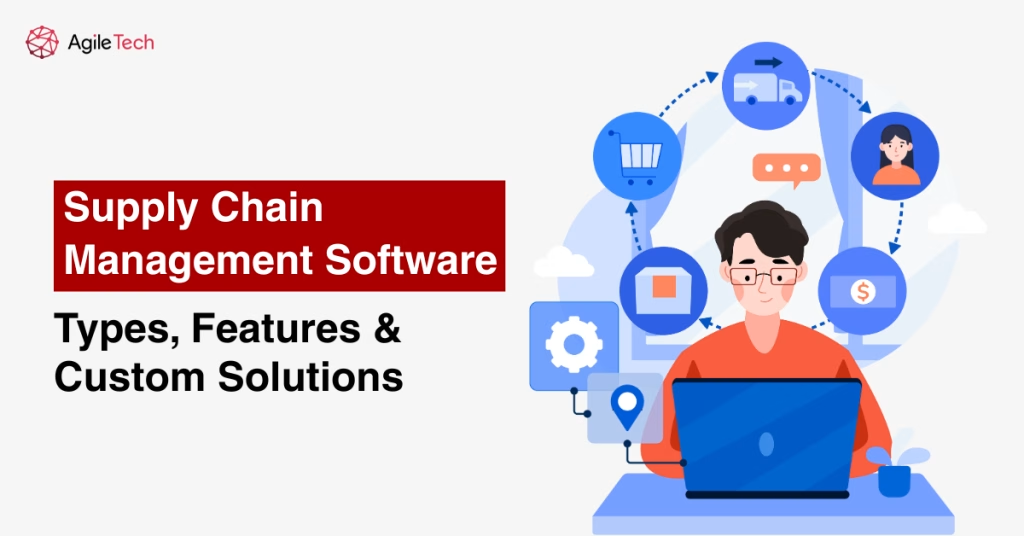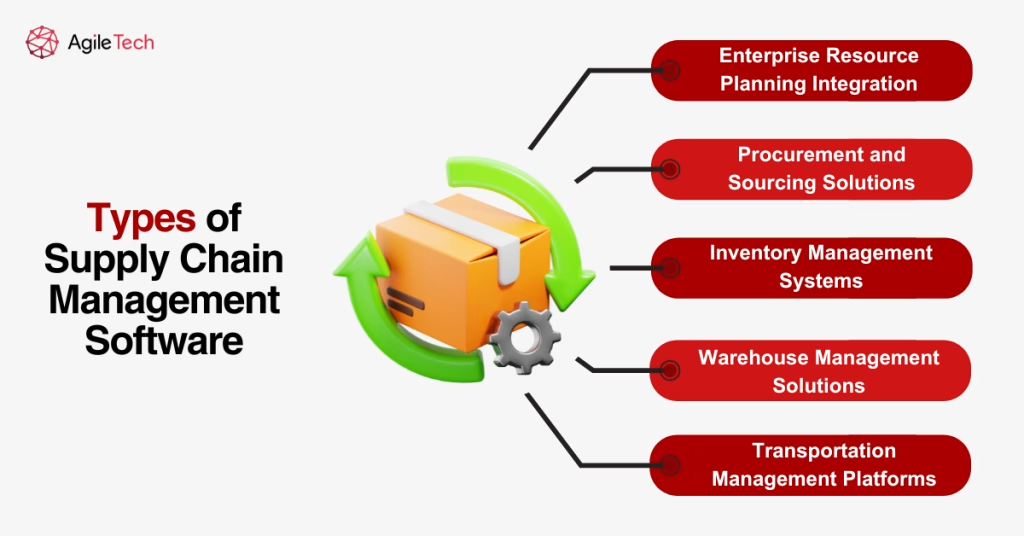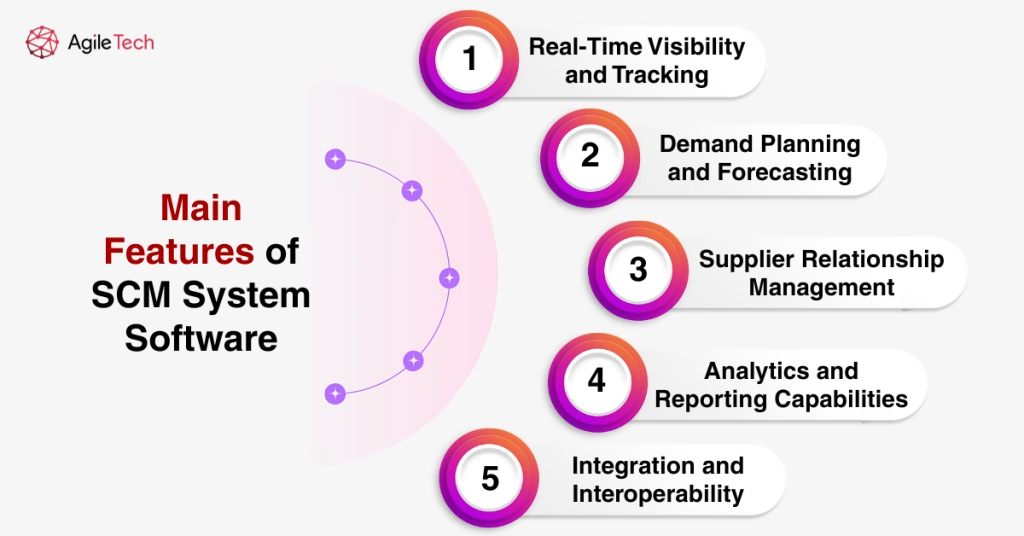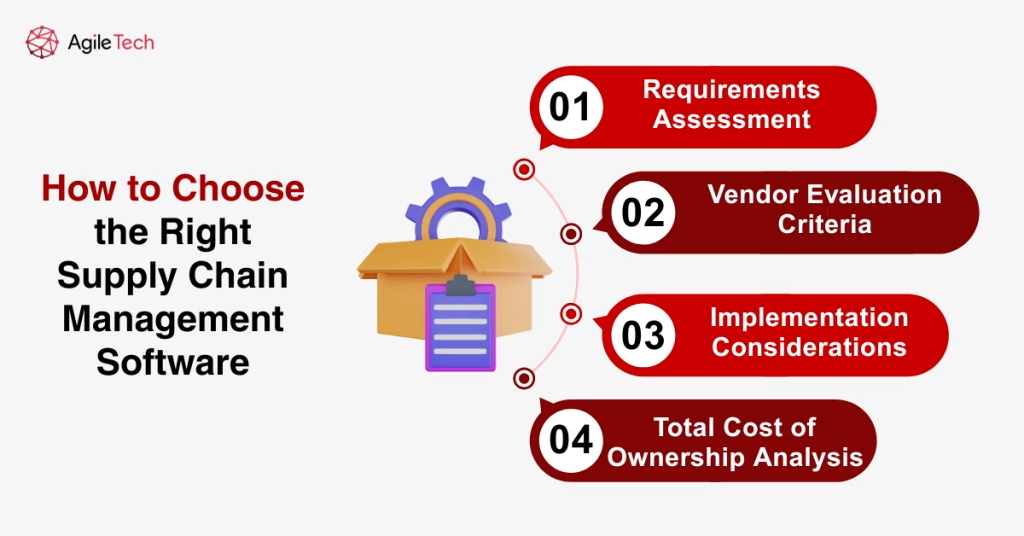Supply Chain Management Software: Types, Features & Custom Solutions
Modern supply chain management software transforms how logistics companies operate, streamline operations, and enhance efficiency. Understanding the right SCM system software solutions empowers organizations to optimize their supply chain processes and achieve sustainable competitive advantages in today’s digital marketplace.

- 1. What Is Supply Chain Management Software?
- 2. Types of Supply Chain Management Software
- 3. Main Features of SCM System Software
- 4. SaaS Supply Chain Management: Advantages and Challenges
- 5. How to Choose the Right Supply Chain Management Software
- 6. The Future of Custom Supply Chain Software
- 7. AgileTech’s Experience in the Software Industry with Supply Chain Management
- 8. Conclusion
1. What Is Supply Chain Management Software?
Supply chain management (SCM) software is a digital solution designed to oversee, coordinate, and optimize the flow of goods, services, and data across a supply chain network. From procurement to distribution, SCM systems streamline every step in the supply chain.
SCM system software helps businesses manage suppliers, monitor production timelines, forecast demand, reduce operational costs, and improve decision-making. These tools are essential for ensuring visibility and agility across the supply chain.
The Role of SaaS in Supply Chain Management Software
Software as a Service delivery models have revolutionized how organizations access and implement supply chain management solutions. SaaS supply chain management software offers significant advantages over traditional on-premises deployments, including reduced implementation costs, faster deployment times, and simplified maintenance requirements.
SaaS platforms provide scalable infrastructure that grows with business needs, eliminating the need for substantial upfront hardware investments. Organizations can access sophisticated supply chain management capabilities without maintaining complex IT infrastructure, allowing them to focus resources on core business activities rather than technology management.
The cloud-based nature of SaaS supply chain management software enables seamless integration with existing business systems while providing automatic updates and security enhancements. This approach ensures that organizations always have access to the latest features and security protocols without requiring manual intervention or costly upgrade processes.
2. Types of Supply Chain Management Software
Supply chain management software encompasses various specialized solutions designed to address specific aspects of the supply chain process. Understanding these different types helps organizations select the most appropriate software for supply chain requirements and operational objectives.

2.1. Enterprise Resource Planning Integration
Enterprise Resource Planning systems with integrated supply chain modules provide comprehensive business management capabilities that extend beyond traditional supply chain functions. These solutions combine financial management, human resources, customer relationship management, and supply chain operations within unified platforms.
The integration approach ensures data consistency across all business functions while eliminating the need for multiple standalone systems. Organizations benefit from streamlined processes, reduced data duplication, and improved operational visibility when implementing integrated ERP solutions with supply chain management capabilities.
2.2. Procurement and Sourcing Solutions
Specialized procurement software focuses on optimizing supplier relationships, contract management, and purchasing processes. These systems provide tools for supplier evaluation, request for proposal management, contract negotiation, and performance monitoring.
Advanced procurement solutions incorporate artificial intelligence capabilities to analyze supplier performance data, identify cost-saving opportunities, and recommend optimal sourcing strategies. These insights enable organizations to build more resilient supplier networks while reducing procurement costs and improving quality standards.
2.3. Inventory Management Systems
Inventory management software addresses the critical challenge of maintaining optimal stock levels while minimizing carrying costs and avoiding stockouts. These systems provide real-time visibility into inventory positions across multiple locations, enabling organizations to make informed replenishment decisions.
Modern inventory management solutions incorporate demand forecasting algorithms that analyze historical data, seasonal trends, and market conditions to predict future requirements. This predictive capability helps organizations optimize inventory investments while ensuring adequate stock availability to meet customer demands.
2.4. Warehouse Management Solutions
Warehouse management systems optimize storage, picking, packing, and shipping operations within distribution facilities. These solutions provide tools for layout optimization, labor management, and automation integration to maximize operational efficiency.
Advanced warehouse management software incorporates technologies such as barcode scanning, radio frequency identification, and automated guided vehicles to streamline material handling processes. These capabilities reduce manual errors, improve productivity, and enhance order accuracy throughout the fulfillment process.
2.5. Transportation Management Platforms
Transportation management software optimizes shipping operations by analyzing carrier performance, route planning, and freight costs, with many modern solutions now integrated into streamlined logistics mobile apps that enhance real-time tracking and operational responsiveness across the supply chain. These systems provide tools for carrier selection, load optimization, and shipment tracking to ensure efficient and cost-effective delivery operations.
Sophisticated transportation management solutions incorporate real-time tracking capabilities that provide visibility into shipment status and delivery performance. This visibility enables organizations to proactively address potential delays while keeping customers informed about their order status.
3. Main Features of SCM System Software
Effective SCM system software incorporates numerous features designed to address the complex requirements of modern supply chain operations. These capabilities work together to provide comprehensive solutions that enhance operational efficiency, reduce costs, and improve customer satisfaction levels.

3.1. Real-Time Visibility and Tracking
Supply chain visibility represents one of the most critical features of modern SCM systems. Real-time tracking capabilities provide organizations with immediate access to information about inventory levels, shipment status, and production progress across their entire supply chain network.
This visibility enables organizations to identify potential issues before they escalate into major problems, implement corrective actions quickly, and maintain customer satisfaction through accurate delivery commitments. Advanced tracking systems incorporate multiple data sources, including supplier feeds, transportation updates, and warehouse management systems, to provide comprehensive operational visibility.
3.2. Demand Planning and Forecasting
Sophisticated demand planning capabilities utilize historical data, market trends, and statistical algorithms to predict future requirements accurately. These forecasting tools help organizations optimize inventory investments while ensuring adequate stock availability to meet customer demands.
Advanced forecasting systems incorporate external factors such as economic indicators, weather patterns, and promotional activities to improve prediction accuracy. Machine learning algorithms continuously refine forecasting models based on actual performance data, ensuring that predictions become more accurate over time.
3.3. Supplier Relationship Management
Comprehensive supplier management features enable organizations to evaluate supplier performance, manage contracts, and maintain strong supplier relationships. These capabilities include supplier scorecards, performance metrics, and collaboration tools that facilitate effective communication and coordination.
Advanced supplier management systems incorporate risk assessment tools that evaluate supplier financial stability, geographic risks, and operational capabilities. This information helps organizations build resilient supplier networks that can withstand various disruptions while maintaining consistent performance levels.
3.4. Analytics and Reporting Capabilities
Robust analytics and reporting features provide organizations with insights into supply chain performance, cost trends, and operational efficiency metrics. These capabilities enable data-driven decision-making while identifying opportunities for continuous improvement.
Modern analytics platforms incorporate artificial intelligence and machine learning capabilities to identify patterns, predict trends, and recommend optimization strategies. Interactive dashboards and customizable reports ensure that stakeholders at all levels have access to relevant information for their specific roles and responsibilities.
3.5. Integration and Interoperability
Seamless integration capabilities ensure that supply chain management software can connect with existing business systems, including enterprise resource planning platforms, customer relationship management systems, and financial applications. This connectivity eliminates data silos while ensuring information consistency across all business functions.
Application programming interfaces and standard data formats facilitate integration with external partner systems, enabling seamless information exchange throughout the extended supply chain network. This interoperability ensures that all stakeholders have access to accurate, timely information necessary for effective collaboration.
4. SaaS Supply Chain Management: Advantages and Challenges
Advantages
1. Cost-Effectiveness
SaaS supply chain management software significantly reduces upfront investment by eliminating the need for physical infrastructure and expensive licenses. Its pay-as-you-go pricing model is especially advantageous for startups and mid-sized logistics companies, enabling them to access enterprise-grade tools within a manageable budget.
2. Rapid Implementation and Deployment
SaaS SCM solutions can be deployed much faster than traditional systems. With cloud infrastructure already in place, businesses can onboard within weeks, accelerating time to value and enabling teams to quickly respond to shifting market dynamics.
3. Seamless Scalability
As businesses grow or experience seasonal fluctuations, SaaS platforms can scale effortlessly to accommodate changing demand. This elasticity allows companies to manage supply chain complexity without the need for constant reconfiguration or reinvestment.
4. Continuous Innovation
Vendors provide regular updates that include security patches, new features, and performance enhancements. Companies using SaaS platforms benefit from cutting-edge innovations without the burden of manual upgrades or system downtime.
Challenges
1. Data Security and Compliance Risks
While SaaS platforms follow industry best practices, storing sensitive supply chain data in the cloud poses cybersecurity risks. Companies must ensure compliance with data protection regulations and implement robust access control mechanisms.
2. Limited Customization
Many SaaS platforms are designed for broad use cases, which may restrict their ability to meet highly specific or industry-unique workflows. Businesses with complex operations may find themselves constrained by these generic functionalities.
3. Internet Dependency and Latency
SaaS applications rely heavily on stable internet connections. Downtime or poor bandwidth in remote or underdeveloped areas can affect real-time data access, which is critical for responsive supply chain decisions.
5. How to Choose the Right Supply Chain Management Software
Selecting appropriate supply chain management software solutions requires careful evaluation of organizational requirements, technical capabilities, and strategic objectives. A systematic approach to software selection ensures that organizations choose solutions that align with their specific needs while providing scalable foundations for future growth.

5.1. Requirements Assessment
Comprehensive requirements assessment forms the foundation of successful software selection processes. Organizations must identify their specific supply chain challenges, operational objectives, and performance metrics to evaluate potential solutions effectively.
The assessment process should involve stakeholders from all relevant departments, including procurement, operations, logistics, and information technology. This collaborative approach ensures that all requirements are captured while building consensus around selection criteria and implementation priorities.
5.2. Vendor Evaluation Criteria
Effective vendor evaluation requires establishing clear criteria that address functional capabilities, technical requirements, and organizational factors. Key evaluation areas include feature completeness, integration capabilities, scalability potential, vendor stability, and support quality.
Organizations should develop weighted scoring systems that reflect the relative importance of different criteria based on their specific priorities and requirements. This systematic approach facilitates objective comparisons while ensuring that selection decisions align with strategic objectives.
5.3. Implementation Considerations
Implementation complexity and resource requirements significantly impact the success of supply chain management software deployments. Organizations must evaluate their internal capabilities, available resources, and timeline constraints when selecting solutions and planning implementation approaches.
Phased implementation strategies often prove more manageable than comprehensive deployments, allowing organizations to realize benefits incrementally while managing risks and resource requirements. Change management planning ensures that users receive adequate training and support throughout the implementation process.
5.4. Total Cost of Ownership Analysis
Comprehensive cost analysis should consider all expenses associated with software acquisition, implementation, and operation over the expected system lifecycle. This analysis should include license fees, implementation services, training costs, ongoing maintenance expenses, and potential upgrade requirements.
Return on investment calculations should quantify expected benefits, including cost savings, efficiency improvements, and revenue enhancements. This financial analysis provides the business case necessary for securing executive approval and budget allocation for supply chain management software investments.
6. The Future of Custom Supply Chain Software
Custom supply chain software development continues to evolve as organizations seek solutions that address their unique operational requirements and competitive strategies. The growing complexity of global supply chains and increasing customer expectations drive demand for specialized solutions that standard software packages cannot adequately address.
Emerging Technology Integration
Artificial intelligence, machine learning, and Internet of Things technologies are transforming custom supply chain software capabilities. These technologies enable predictive analytics, autonomous decision-making, and real-time optimization that enhance supply chain performance while reducing operational costs.
Blockchain technology offers potential solutions for supply chain transparency and traceability challenges, particularly in industries with complex multi-tier supplier networks. Smart contracts can automate compliance verification and payment processes while reducing administrative overhead and improving transaction security.
Industry-Specific Solutions
Different industries have unique supply chain requirements that generic software solutions may not adequately address. Custom supply chain software enables organizations to implement industry-specific workflows, compliance requirements, and performance metrics that align with their operational realities.
Healthcare, automotive, aerospace, and food industries have particularly stringent requirements regarding traceability, quality control, and regulatory compliance. Custom solutions can incorporate these specialized requirements while providing the flexibility necessary to adapt to changing regulations and industry standards.
Integration and Ecosystem Considerations
Modern custom supply chain software must integrate seamlessly with existing business systems and external partner platforms. Application programming interfaces, data standards, and integration frameworks facilitate these connections while ensuring data consistency and operational efficiency.
The rise of supply chain ecosystems requires custom software solutions that can participate effectively in collaborative networks involving multiple organizations. These solutions must support standardized data exchange protocols while maintaining security and competitive confidentiality requirements.
Scalability and Performance Requirements
Custom supply chain software must accommodate growing transaction volumes, expanding geographic operations, and increasing complexity without compromising performance. Cloud-native architectures and microservices designs provide the scalability and flexibility necessary to support organizational growth.
Performance optimization becomes increasingly critical as supply chain software processes larger data volumes and supports more complex analytics requirements. Custom solutions can implement specialized algorithms and data structures that optimize performance for specific use cases and operational patterns.
7. AgileTech’s Experience in the Software Industry with Supply Chain Management
AgileTech specializes in developing custom supply chain software solutions for logistics companies navigating complex operational challenges. Our expertise addresses unique software industry requirements, from licensing arrangements and vendor coordination to agreement monitoring.
Addressing Industry-Specific Challenges
Logistics companies face distinct supply chain challenges, including vendor relationship management, license compliance tracking, and integration complexity. Our solutions accommodate these specialized requirements while incorporating advanced analytics and artificial intelligence capabilities that provide competitive advantages.
Our Development Approach
We utilize modern development methodologies to create scalable, maintainable solutions that grow with client businesses. Our implementation strategy emphasizes careful planning, stakeholder engagement, and phased deployment approaches to ensure measurable business value while minimizing operational disruption.
Ongoing Innovation and Support
AgileTech maintains long-term client relationships through continuous improvement initiatives and technology evolution support. Our research and development efforts focus on emerging technologies, automation opportunities, and integration innovations that enhance supply chain management capabilities in dynamic market environments.
8. Conclusion
Supply chain management software is now essential in the fast-paced software industry. From SaaS solutions to custom platforms, these tools empower companies to streamline operations, boost efficiency, and build resilience in the face of evolving market demands. As supply chains become more complex, investing in the right SCM system software ensures long-term agility and competitive advantage.
Whether you need a scalable SaaS platform or a custom supply chain solution, AgileTech offers software tailored to your business needs and growth strategy. Get in touch with us today to start transforming your supply chain into a strategic asset.